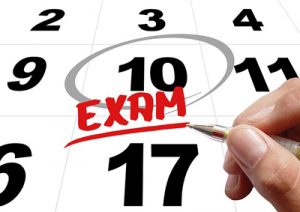
Let’s face it: there is no way to develop a successful study plan for the GRE without knowing what the exam is actually going to be testing you on. What are the major academic skills that the test covers? What content should you have down cold? What is on the GRE?
In this article, I’ll explain everything the GRE tests. I’ll break down what you need to know for each section of the test and explain the different types of questions, before wrapping up with some general tips on how to prep.
Exam Format Basics: The 3 Sections of the GRE
Before discussing exactly what topics, content areas, and skills are tested on the GRE, I’m going to quickly describe the three different sections that you’ll see on the test. (For a much more detailed look at the format of the test, check out our GRE Format and GRE Syllabus articles.)
The first section is always Analytical Writing, which consists of two 30-minute essay parts: “Analyze an Issue” and “Analyze an Argument.”
Then there are two sections of Verbal Reasoning and two sections of Quantitative Reasoning which can all appear in any order (in other words, the Verbal and Quantitative sections could alternate, or bookend each other).
Each Verbal Reasoning section is 30 minutes long and has 20 questions (or 35 min/25 questions if you’re taking the paper test). 10 of the questions ask you to complete sentences with the appropriate vocabulary words or phrases. The other 10 questions give you reading passages and ask you to answer questions based on those passages.
Each Quantitative Reasoning section is 35 minutes long and has 20 questions (or 40 min/25 questions if you’re taking the paper test). In this section, the questions will ask you to compare quantities, solve word problems, or analyze data in graphs and tables using math concepts.
Quick side note: we've created the world's leading online GRE prep program that adapts to you and your strengths and weaknesses. Not sure what to study? Confused by how to improve your score? We give you minute by minute guide.
You don't NEED a prep program to get a great GRE score. But we believe PrepScholar is the best GRE prep program available right now, especially if you find it hard to organize your study schedule and don't know what to study.
Click here to learn how you can improve your GRE score by 7 points, guaranteed.
So what is on the GRE, actually? Now we can dig into what skills, knowledge, and abilities you have to bring to each section.

What Is on the GRE Analytical Writing Section?
In the Analytical Writing section, you’ll be writing two different short essays. For both essays you’ll need to:
-
- Think critically and analyze the prompt.
- Quickly formulate an overarching argument.
- Outline a series of logically connected ideas that build and support your argument, and then explain these ideas cogently.
- Use precise, specific evidence to back up your argument’s logical flow.
- Write clearly and coherently, in formal prose.
- Use elevated language, vary sentence structure, and minimize grammar and spelling mistakes.
Let’s go essay by essay to see the differences in the skills you’ll need to display for each one.
The “Analyze an Issue” Essay
In the Issue essay, you’re basically on one side of a debate. In other words, this is an essay where you’re trying to convince someone that your point of view is right.
The essay prompt will consist of a statement and a set of instructions. You’ll have to take a position on the statement – either pro, con, or somewhere in the more nuanced middle. Then, you’ll have to use outside examples (i.e. your own knowledge of current events or historical precedent) to create a coherent argument supporting the position you’ve taken.
Besides all the above-mentioned academic writing skills, you need to be reasonably well versed in general knowledge current events so you can understand what the prompt is referencing. You should also have good recall of specific issues, events, people, or situations to use as evidence or examples in your essay.
Sample “Analyze an Issue” Essay Question
Here’s an example of a general statement and a prompt:
To understand the most important characteristics of a society, one must study its major cities.
Write a response in which you discuss the extent to which you agree or disagree with the statement and explain your reasoning for the position you take. In developing and supporting your position, you should consider ways in which the statement might or might not hold true and explain how these considerations shape your position.
So, in order to coherently argue a pro or con position on this, it would help to know:
-
- A way to define what a “society” is (people connected by geography? Trade? Shared culture? Political or legal frameworks?)
-
- What some characteristics of a society might be (its arts and culture? Its military prowess? Its relationship to its political/geographic neighbors? Its degree of repressiveness/progressiveness? Its homogeneity/diversity?)
-
- Several examples of major cities and how they compare/contrast to one another in terms that correspond to whatever you defined society as being, and whatever you posited as being the most important characteristics of a society
-
- Several examples of other places to find the important characteristics of a society that aren’t cities (perhaps uncultivated wilderness areas? Agricultural centers? Cultural or scientific production that isn’t reliant on city life?)
How to prepare for the “Analyze an Issue” Essay
First, you must read broadly. I recommend a weekly deep dive into a few articles from Wired, Vox, The Atlantic, Slate, or FiveThirtyEight. If you have access to a subscription, you can also read The Economist, The New York Times, Time Magazine, Science Magazine, or The New Yorker. Articles in these publications will give you a solid overview of issues in the world and some approaches for thinking about them. You can use these approaches as examples or logical arguments in your essay.
Next, I have great news! Every single possible Issue topic has been published by ETS, so you will never be blindsided. Go through the list of topics in the pool of Issue statements. For each one, ask yourself: what facts and examples do I need to know to successfully answer this? If you come across a topic that you can’t generate 2-3 examples off the top of your head (which you’ll need to do on the GRE), do some light directed reading in on the topic.
Finally, after you’ve thought about each of the Issues topics on the list, pick a few of them, and then write essays as though doing the Analytical Writing section. You may want to write one essay untimed, and then introduce the 30-minute time limit for your second or third round of practicing. If possible, ask a friend to look over what you’ve written, using the Issue scoring guides as a basis on which to judge your work.
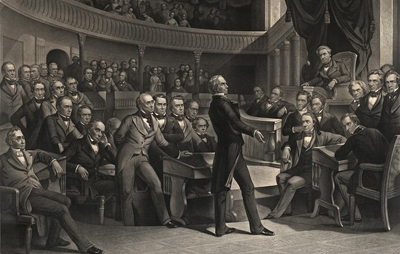
The “Analyze an Argument” Essay
If the “Analyze an Issue” essay makes you a debater, then the “Analyze an Argument” essay makes you a debate judge.
Instead of coming up with arguments to support your point of view, your job is to do a complete takedown of the flaws, errors, logical gaps, and faulty assumptions of an existing argument.
Besides all the above-mentioned academic writing skills, you need to take each part of an argument apart into its components -ideas, logic and reasoning, written and unwritten underlying assumptions, examples and evidence – and see how these parts connect to one another. You should also show that you understand the function of words and phrases that are used to make logical connections (words like however, thus, therefore, evidently, hence, in conclusion), in order to follow the logical leaps an argument makes. Finally, you have to be able to list the kinds of evidence or proof that would be useful but that aren’t brought to bear in the argument as is (Polls? Maps? Sales data? Historical background?).
Note: because you aren’t going to be dealing with the content of the argument topic, you don’t need to know any specific discipline or area of study for this essay.
Sample “Analyze an Argument” Essay Question
Here’s an example of an Argument essay argument paragraph and prompt:
Woven baskets characterized by a particular distinctive pattern have previously been found only in the immediate vicinity of the prehistoric village of Palea and therefore were believed to have been made only by the Palean people. Recently, however, archaeologists discovered such a “Palean” basket in Lithos, an ancient village across the Brim River from Palea. The Brim River is very deep and broad, and so the ancient Paleans could have crossed it only by boat, and no Palean boats have been found. Thus it follows that the so-called Palean baskets were not uniquely Palean.
Write a response in which you discuss what specific evidence is needed to evaluate the argument and explain how the evidence would weaken or strengthen the argument.
So, in order to answer this well, you have to understand what the original argument is using for evidence and whether that evidence holds up the reasoning it’s supposed to undergird.
For example, one logical step in this argument is that the Palean people never crossed the Brim River. The evidence for this is that no Palean boats have ever been found. Using your understanding of how evidence actually works, you would find a flaw in this part of the argument by pointing out that not finding boats doesn’t mean the Paleans didn’t cross the river:
- They could have used rafts or some other flotation method.
- Their boats could have been destroyed since “prehistoric” boats were probably biodegradable.
- There could be other evidence of boat-making that isn’t actual boats – drawing of boats, carpentry tools, other evidence (besides baskets) of Paleans in other upriver or downriver villages.
Another thing you would have to be able to do is see the underlying assumptions that remain unwritten, and to examine them for problems.
One underlying assumption here is that there are two ways a Palean basket could have ended up in Lithos: someone in Lithos made it, or Paleans sailed to Lithos by boat. Using your understanding of founded and unfounded assumptions, you would see that this assumption leaves out many other ways of accounting for this basket’s presence in Lithos. For instance:
- The Lithos people could have sailed to Palea to get it.
- Palean people could have traded their baskets to another village, and that village, in turn, traded them to Lithos.
How to Prepare for the “Analyze an Argument” Essay
Just as with the “Analyze an Issue” task, reading broadly will give you the basis for understanding real-world connections between facts and the conclusions you can draw from them.
But the best way to practice for this part of the GRE is to make good use of the pool of Argument topics. Again, just as with the Issue topics, ETS has published every single possible Argument topic and prompt! Go through them one by one, and see if you can find:
-
- Where does one step of the argument connect to the next?
- What evidence does this passage use?
- What assumptions does it make about what it’s saying?
- What explanations is the passage not addressing?
Just as with the Issue topic, you should also write a few Argument essays and ask a friend to evaluate your work using the guidelines for scoring that ETS provides.
Want to improve your GRE score by 7 points? We have the industry's leading GRE prep program. Built by world-class instructors with 99th percentile GRE scores, the program learns your strengths and weaknesses through machine learning data science, then customizes your prep program to you so you get the most effective prep possible.
Try our 5-day full access trial for free:
What Is on the GRE Verbal Reasoning Section?
The Verbal Reasoning section can be broken up into types of questions that test two different skill sets. On each Verbal Reasoning section, 10 Text Completion and Sentence Equivalence evaluate how well you know your vocab words, while 10 Reading Comprehension gauge how well you understand what you’ve read.
In this section, you’ll select the right words or phrases to complete sentences, find pairs of synonyms that could fill blanks in sentences, and answer questions about passages of formal writing.
Vocab Questions
Text Completion questions give you short passages with 1-3 words or phrases left out, and a choice of possible words to insert into each of the blanks. You have to pick the right words to complete the sentences, and for each question, you have to pick all the words correctly to get points – there’s no partial credit.
Sentence Equivalence questions give you a sentence with one word or phrase missing. Your job is to find two synonyms – two possible ways to complete the sentence out of six answer choices.
To do well, you need to know formal, elevated vocabulary and how to correctly use words in context. You’ll use primarily vocabulary-related knowledge to answer the Text Completion and Sentence Equivalence questions. But it may also help to know some grammar – often, the way the sentence is built will help you determine the right words to complete it.
SAMPLE Vocab QUESTIONs
Here are two examples of the kinds of vocabulary-testing questions you’ll find on the GRE. First is a Text Completion question.

In this question, it helps to understand sentence construction grammar. If you know that the colon in the middle is used to set off a clause that explains or expands on the previous clause, you can determine that the first blank word should be synonymous with “success” and the second should match “prone to violence.” The answers are “eminence” and “tumultuous.”
Below is a Sentence Equivalence question, where you have to find a pair of synonyms that could each complete the sentence.
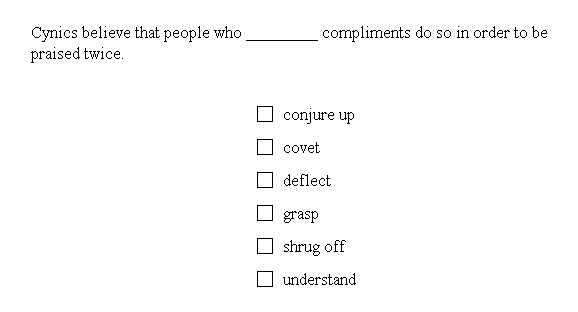
Knowing the vocabulary words will help you realize that there are two pairs of synonyms available: “grasp”/“understand” and “deflect”/”shrug off.”
You might also recognize that the sentence is describing “cynics” – people who take a very dim and pessimistic view of human nature. They would assume others are fishing for compliments by acting in a deceptive manner, so the answers are “deflect” and “shrug off.”
How to Prepare for Vocab Questions
First and foremost, you should beef up your vocab knowledge by using flashcards to master key words. To get you started, check out our own flashcard set of the 357 words you need to know for the GRE!
Next, use your reading material from your Analytical Writing prep work to also practice your synonyms: pick out a sentence, select a few important words in it, and think of synonyms for those words.
Finally, read broadly. I’ve said it before, and I’ll keep saying it. Reading a lot teaches you how language works and how words are used, and builds your vocabulary better than almost anything else.
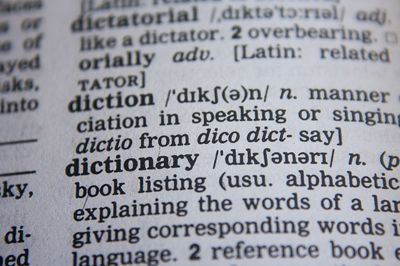
Reading Comprehension Questions
The questions on this part of the Verbal Reasoning section are based on passages anywhere from one to several paragraphs in length. These passages come from any number of disciplines: the sciences, business, the arts, or the humanities. Although they aren’t written in academic prose, you have to be ready to handle the elevated language of formal writing.
The good news, however, is that you don’t need to know anything about the passage’s subject matter because the questions focus not on content but on structure. You have to demonstrate a good understanding of how paragraphs are constructed, how to extract meaning from what you are reading, how to paraphrase the key ideas of a passage, how to draw conclusions from the passage, and how to make inferences about things that aren’t directly spelled out in the passage.
SAMPLE REading Comprehension QUESTIONs
Some questions will be multiple choice with one answer. Others will be multiple choice with several answers (meaning, you have to get each and every one of the right answers to get credit for the question). Finally, some questions ask you to click on a sentence inside the passage itself to answer.
Here is an example of a 1-answer multiple choice question:

The question asks: which answer choice is referenced in the passage? The first three answers aren’t in the passage at all. The fourth is something that the passage implies since it defends Glass’s tendency to use popular music in his work. But only the fifth answer choice is actually directly addressed, when the passage argues that Glass’s “symphonies’ sound is distinctly his” – in other words, they don’t sound like the work of someone else.
Here’s an example of a multiple-choice question that has more than one correct answer:

The question is asking how the passage characterizes Glass’s music. Answer choice 2 is wrong – the passage argues that Glass’s music is “not a version of popular music.” Answer choice 1 fits – Glass is “reviving” classical music infused with popular elements. And answer choice 3 also fits – the passage implies that Glass’s music has always involved this kind of fusion.
Finally, here’s an example of a select-in-passage question:

Here, you have to click the passage sentence that describes two possible ways to combine rock and classical music. This happens in the last sentence of the passage, where the author talks about popular music being written for classical audiences, and classical music written for rock audiences.
HOW TO PREPARE FOR Reading Comprehension QUESTIONS
Because the passages used for these questions come from the type of writing found in magazines and books, you have plenty of sources for finding suitable writing for Reading Comprehension practice.
Want to improve your GRE score by 7+ points?
Check out our best-in-class online GRE prep program. We guarantee your money back if you don't improve your GRE score by 7 points or more.
PrepScholar GRE is entirely online, and it customizes your prep program to your strengths and weaknesses. We also feature 2,000 practice questions, official practice tests, 150 hours of interactive lessons, and 1-on-1 scoring and feedback on your AWA essays.
Check out our 5-day free trial now:
As always, simply reading broadly and frequently will help with this section. However, you should use the material you are reading to boost your skills as well.
When you read, use shorter articles to do more specific prep work for this part of the GRE. For each article:
- Find the main idea of each paragraph. Find the sentence that conveys that main idea.
- Identify pieces of evidence used to argue for and support this main idea. How does each piece of evidence make the author’s case?
- Follow the connections between the paragraphs. How does each paragraph’s main idea lead into the next? What is the logical sequence the author is following?
- Figure out the intent of the article. Is it to inform? To disprove a previous argument? To compare two different approaches? What is the author’s overall goal?

What Is on the GRE Quantitative Reasoning Sections?
In Quantitative Reasoning, you’ll be tested on arithmetic, geometry, and algebra.
You’ll also be tested on how well you can use logic to solve word problems. This means that many problems that don’t need to be solved through brute-force calculation, but instead through estimates and inferences. This also means that in multiple choice questions, the wrong answers will most likely be what you would have gotten if you misinterpreted the logic of the question or word problem.
Finally, you’ll also be tested on whether you can correctly interpret data from graphs, charts, and other ways of visually displaying data.
There are four types of quantitative question formats:
- 8 Quantitative Comparison questions, where you’ll compare two quantities to figure out whether one is bigger than the other, whether they are equal, or whether there’s not enough info to know
- 4-6 Multiple Choice questions, where you will either have to pick one correct answer or multiple correct answers (and you have to get all the correct answers to get credit for the question). Some will
- 4-6 Numeric Entry questions, where you’ll have to type in your own answer – which will be either an integer, a decimal, or a fraction
- 3 Data Interpretation questions, which will be either multiple choice or numeric entry, and will refer to data presented on a chart or graph
Breakdown of Math Concepts Tested
To be well prepared for this part of the GRE, you have to have a good grasp of the following:
Arithmetic:
-
- Basic properties of integers: the number line, divisibility, factorization, remainders, arithmetic operations, and odd and even integers
- Complex properties of integers: prime numbers, absolute value, exponents and roots, sequences of numbers
- Fractions, ratios, and percentages
Algebra:
-
- Equations: factoring and simplifying algebraic expressions, solving linear and quadratic equations, solving simultaneous equations
- Graphing Equations: graphing equations; solving equations expressing lines, slopes, and intercepts
- Operations with exponents
- Solving word problems
Geometry:
-
- Coordinate geometry: graphing lines on an xy-axis,
- Triangle, circle, and polygon geometry: the Pythagorean theorem, area, perimeter
- Lines and Angles: parallel and perpendicular lines, angle measurement in degrees
- Solid geometry: three-dimensional figures, volume
Data Analysis:
-
- Statistics: mean, median, mode, range, standard deviation
- Interpreting Data in Tables and Graphs: line graphs, bar graphs, circle graphs, boxplots, scatterplots, Venn diagrams
- Basic probability: probabilities of compound events and independent events
Sample Quantitative Reasoning Questions
Let’s go through a few examples of the different types of questions you’ll see on the Quantitative sections of the GRE.
Here is an example of a Quantitative Comparison question:
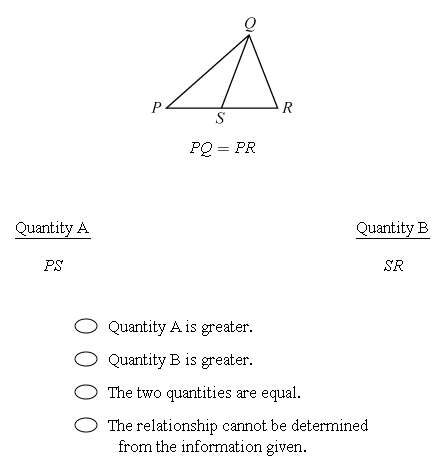
This is a logic question disguised as a geometry one. Just because PS looks about the same length as SR, doesn’t mean that this is true. Since nothing in the problem tells us how large angle PQS and angle SQR are, we don’t know exactly where line QS intersects line PR. It could bisect it, or it could be closer to P or closer to R. So, the answer is that we don’t have enough information to know which of the line segments is bigger.
Here is an example of a single-answer Multiple Choice question that is also a Data Interpretation question:

This problem tests how well you can connect the percent of change to the real value that this change represents. Here, since Store P started with $800,000 in 2006, and grew by 10% from 2006 to 2007, that means that at the end of 2007, Store P had 110% of the dollar amount that it started with. So, ($800,000 * 1.1) = $880,000.
Now we do the same thing again with the next year. Store P started 2007 with $880,000 and then lost 10% of this value from 2007 to 2008. That means that at the end of 2008, Store P had 90% of the amount it had in 2007. So, ($880,000 * 0.9) = $792,000.
How to Prepare for Quantitative Reasoning Questions
The best thing you can do to prepare for math is to really make sure that you have the core concepts down cold. There are several excellent resources for doing this.
Khan Academy has videos that explain the topics covered on the GRE — learn how to use Khan Academy to study for the GRE.
ETS has also published a detailed math review that goes into everything covered on the test, as well as a guide to the math conventions used on the GRE.
Finally, you can refamiliarize yourself with these concepts by using your math textbooks from high school and college.

The Bottom Line: What Does the GRE Test?
Analytical Writing consists of two 30-minute essays: “Analyze an Issue” and “Analyze an Argument”:
- In the Issue essay, you’re trying to convince someone that your point of view is right. You’ll take a position on a statement – either pro, con, or in the middle – and then use outside examples to create a coherent argument supporting the position you’ve taken.
- To prepare for the Issue essay: read broadly, go through the list of topics in the pool of Issue statements, and use them write essays as though doing the Analytical Writing section.
- In the Argument essay, your job is to find the logic and evidence flaws of an existing argument.
- To prepare for the Argument essay: read broadly, pick apart the pool of Argument topics, and use them to write a few Argument essays.
There are two sections of Verbal Reasoning, each 30 minutes long with 20 questions.
- 10 Text Completion and Sentence Equivalence test how well you know your vocab words, while 10 Reading Comprehension tests how well you understand what you’ve read.
- To prepare for the Vocab questions: beef up your vocab knowledge by using flashcards; read broadly and use your reading material to practice synonyms: pick out a sentence, select a few important words in it, and think of synonyms for those words.
- To prepare for Reading Comprehension questions: read broadly and use shorter articles to find the main idea of each paragraph, identify pieces of evidence used to argue for and support this main idea, notice how one paragraph’s main idea leads into the next, and figure out the intent of the article.
There are two sections of Quantitative Reasoning, each 35 minutes long with 20 questions.
- You’ll be tested on arithmetic, geometry, and algebra; how well you can use logic to solve word problems; and on whether you can correctly interpret data from graphs and charts.
- There are eight Quantitative Comparison questions, where you’ll compare two quantities to say which is bigger; four to six Multiple Choice questions, with one answer or several correct answers; four to six Numeric Entry questions, where you’ll have to type in your own answer; and three Data Interpretation questions about a chart or graph.
- To prepare for Quantitative questions: have the core concepts down cold by visiting Khan Academy, ETS’s math review and guide to GRE math conventions.
What’s Next?
Now that you know what’s on the GRE, the important next step is that you prep for the exam!
More questions about the GRE format? Check out our complete guide to the computerized test’s structure and how to use it your advantage.
Wondering about what GRE scores mean? Check out our complete guide to the score range and our breakdown of GRE percentiles.
Ready to improve your GRE score by 7 points?
We've written a eBook about the top 5 strategies you must be using to have a shot at improving your GRE score.
Download it for free now:

